“The Conscience of the King”
Written by Barry Trivers
Directed by Gerd Oswald
Season 1, Episode 12
Production episode 6149-13
Original air date: December 8, 1966
Stardate: 2817.6
Captain’s log. We open with Kirk and an old friend of his named Dr. Thomas Leighton watching a production of Macbeth. Leighton insists that Anton Karidian, the leader of the theatre company, who’s playing the title role, is Kodos the Executioner. Leighton is so sure that he lied to Kirk, telling him he’d discovered a synthetic food that could end famine, diverting the Enterprise. Kirk is sure that Kodos is dead, but Leighton is convinced that Karidian is Kodos, and he’s going to prove it by inviting the theatre company to a cocktail reception at his house that night. Kirk, though, just goes back to the Enterprise.
Kirk looks up the records on Kodos, who was the governor of Tarsus IV twenty years earlier. He declared martial law and slew half the colony’s population. He then compares Kodos’s records to that of Karidian, only to find that there’s very little in the computer on the actor, and nothing prior to twenty years ago. He calls up pictures of them, and they look similar…
His hackles are raised enough that Kirk decides to beam down and attend the cocktail party. He arrives to find Leighton has gone to town to run an errand and also that Karidian refuses to attend parties. Kirk does get to meet and flirt with Karidian’s daughter Lenore, even going so far as to invite her for a walk outside.
Before they can smooch, however, Kirk finds Leighton’s body. He immediately calls the Astral Queen, the ship that is ferrying the acting company to Benecia for their next gig, and calls in a favor with the captain to strand the actors so he can take them.
Sure enough, Lenore beams aboard and asks if Kirk will give them a lift to Benecia, as they’ve been stranded by the Astral Queen. Kirk demurs, but eventually “gives in” and agrees to transport them in exchange for a performance. He then checks the computer to see how many people can positively identify Kodos. Kirk is one, as is Leighton—another is Riley, whom Kirk immediately transfers to engineering, despite Spock’s reminder that he’ll consider it a demotion, though Kirk refuses to tell Spock why he’s doing it.
Kirk gives Lenore a tour of the ship, including the shuttle bay. They talk in the observation deck above the shuttle bay, where Lenore talks about the power of a ship, pulsing and throbbing under his control. (Subtle, she ain’t.) They finally get the smooch that was cut off by finding Leighton’s body.
Spock, distressed by Kirk’s seemingly out-of-character behavior, goes to McCoy, but the doctor hasn’t noticed anything wrong. So Spock digs a little deeper, and discovers a commonality among Kirk, Riley, and Leighton: Tarsus IV. A fungus destroyed the food supply, leaving 8000 colonists with virtually no food. Kodos declared martial law, killing half the colony, before relief arrived. Kodos was killed, but his body was never positively identified.
There are only nine eyewitnesses who can positively identify Kodos, and to Spock’s chagrin—and McCoy’s when he shares it with him—seven of them are dead, with Leighton being the seventh. They all died when the Karidian acting company was near. The only ones still alive are Kirk and Riley.
Riley is stuck in engineering on the night shift. He calls the rec room for some human connection, and gets Uhura to sing a song to him. As he listens to the song, a shadowy figure sneaks into the engine room and squirts something into his drink when he isn’t looking. Riley drinks it and collapses. He’s rushed to sickbay.
Spock and McCoy report to Kirk that Riley was poisoned, and Spock points out that Kirk could be next. Kirk resents Spock poking his nose into Kirk’s personal business, but his anger is short-lived, especially given that Spock is right to be concerned. But Kirk also has no real proof that Karidian is Kodos, and he won’t accuse someone of being that monster without ironclad evidence.
And then he finds a phaser on overload in his quarters, which he barely finds and disposes of in time. He’s been targeted as well.
So he goes straight to Karidian’s quarters and confronts him. He gives him words to say, words that they have a recording of Kodos saying. Karidian speaks them without even looking, and he and Kirk verbally fence for several minutes. It’s clear that Karidian is Kodos, though he refuses to admit it directly.
Lenore interrupts them, and tells her father to rest, and then she castigates Kirk, believing his flirting to just be a tool to get at her father. She says there’s no mercy in him, and Kirk counters that if Karidian is Kodos, Kirk’s shown him more mercy than he deserves for all the harm he did. When Lenore asks who he is to say what harm was done, Kirk quietly asks, “Who do I have to be?”
Riley is well enough to be discharged, but Kirk wants him confined to sickbay. Riley overhears McCoy recording a medical log that voices Kirk’s suspicions that Karidian is Kodos.
The Karidian company starts their performance of Hamlet (with Karidian playing Hamlet’s father’s ghost) just as McCoy discovers that Riley has checked himself out of sickbay—and security reports that the weapons locker has been broken into and a phaser is missing.
Kirk finds Riley backstage. Riley is sure that Karidian is Kodos, but Kirk talks him down.
Karidian heard Riley’s voice, and he tells Lenore that he is haunted by a role he played long ago. Lenore, however, admits that she killed the seven witnesses and will kill the other two before the night is done. Karidian is devastated—it’s more blood on his hands. Lenore insists it’s to save her father, but the one thing he wanted was for her to be untouched by his past. Kirk summons a security guard to take both Karidians away, but Lenore grabs the guard’s phaser and runs onto the stage. She threatens Kirk, but Karidian jumps in front of the phaser beam. Lenore screams, and has a bit of a psychotic break upon realizing she’s killed her own father.
McCoy provides a medical report for Kirk, and asks him if he had feelings for Lenore. Kirk’s response is to order the ship ahead warp factor one.
Can’t we just reverse the polarity? Apparently, the only way to be sure that Karidian is Kodos is to compare his voice print to that of a recording they have of Kodos. Because apparently a blood sample or a fingerprint is too complicated?
Fascinating. Spock implies that Vulcans don’t drink alcohol, and McCoy retorts that that’s why they were conquered—a line that is at odds with what’s established about Vulcans in general (especially on Enterprise) and in “The Immunity Syndrome” in particular, when Spock explicitly states that Vulcan has not been conquered in its recorded history. (Then again, McCoy was drinking in the scene…)
I’m a doctor not an escalator. McCoy is initially dismissive of Spock’s concerns—though it might just be because he was drunk—but once Riley is poisoned, he starts to come around, though he keeps more of an open mind than Spock does.
Hailing frequencies open. Uhura’s acceding to Riley’s request for a song probably saves the latter’s life, as they only know he’s been poisoned because the channel is open for them to hear him make chokey noises and can call sickbay. Riley probably would’ve died if he didn’t have the intercom open to the rec room.
Go put on a red shirt. The guards are put on alert to search for Riley, but it’s Kirk who finds him. The guard Kirk summons to take the Karidians away manages to get his phaser taken from him. Competence!
No sex, please, we’re Starfleet. Kirk hits on Lenore the microsecond he lays eyes on her, and she flirts right back. It would probably be charming and romantic except for the part about how he was using her to get at her father and how she was plotting to murder him…
Channel open. “In the long history of medicine, no doctor has ever caught the first few minutes of a play.”
McCoy just before he discovers Riley is missing, at which point he misses a helluva lot more than the first few minutes.
Welcome aboard. Bruce Hyde makes his second and final appearance as Riley, following “The Naked Time,” and it’s also the final appearance of Grace Lee Whitney as Rand, at least on the TV series (she’ll next be seen in The Motion Picture). David Troy plays Matson, while recurring regulars DeForest Kelley and Nichelle Nichols appear as McCoy and Uhura, and regular extra Eddie Paskey gets a couple of lines of dialogue and a name: Mr. Leslie.
Veteran character actor Arnold Moss and Barbara Anderson do superlative work as Karidian père et fille, while William Sargent and Natalie Norwick play the Leightons and Karl Bruck and Marc Adams play the other members of the Karidian company.
Trivial matters: Several works of tie-in fiction have dealt with the Tarsus IV massacre that Kirk and Riley witnessed as children, including the novels Final Frontier by Diane Carey and Avenger by William Shatner and Judith & Garfield Reeves-Stevens, and the short story “Though Hell Should Bar the Way” by Greg Cox in Enterprise Logs. Cox also recently wrote a sequel to this episode entitled Foul Deeds Will Rise. Your humble rewatcher also had Kirk be put in a decision to have to declare martial law in The Brave and the Bold Book 1, and his experiences on Tarsus IV made him that much more eager to do it right, as it were.
Kirk refers to the “Star Service,” another of the experimental early names for what was eventually referred to as Starfleet, including UESPA (United Earth Space Probe Agency) from “Charlie X.”
The original draft has a Lieutenant Robert Daiken as the other survivor of Tarsus IV, and James Blish’s adaptation in Star Trek 1 doesn’t reflect the change that was made to Riley when Bruce Hyde was cast.
Grace Lee Whitney knew she was fired when she filmed her glorified cameo on the bridge, which would be her last appearance on the series.
Uhura sings “Beyond Antares” to Riley, a song whose lyrics were written by producer Gene L. Coon, with music by the show’s music consultant Wilbur Hatch. Though she was seen only accompanied by the Vulcan lyre, in truth she was backed by piano (Marl Young), guitar (Laurindo Almeida), and harp (Catherine Gotthoffer). Uhura will be seen to sing the song again, a cappella, in “The Changeling.”
Leighton’s face covering is similar to one used in “The Duplicate Man,” an episode of The Outer Limits that was also directed by Gerd Oswald.
The opening scene is Act II, scene 1 from Macbeth when Macbeth (played by Karidian) murders King Duncan and then meets with Lady Macbeth (played by Lenore). Although in Shakespeare’s play, that murder is offstage, while we see the murder in this particular production.
To boldly go. “The play is over—it’s been over for twenty years.” The modern viewer has to do a lot of brain-turning-off when watching this episode. It’s the super-duper 23rd century, where they can go faster than light and travel to distant stars and terraform worlds—but the only way to identify someone is by eyewitnesses and an unreliable voice comparison. And a body “burned beyond recognition” is impossible to identify. We’re only five decades removed from when Star Trek was filmed, and all of that sounds hilariously primitive.
But then, it’s the conundrum of watching Star Trek, since, if you take away the transporter and the warp drive, a Manhattan office building is about a billion times more technologically advanced than the Enterprise. Most of the time, it’s easy to suspend that disbelief, but this episode has aged really badly because that lack of prescience of the march of technology and science is integral to the plot.
However, assuming it doesn’t cut off the air supply to your disbelief, this is a helluvan episode. The script is wise to keep Karidian off camera for the first half, aside from briefly seeing him in the title role of Macbeth. Instead, we only get reminisces of Kodos, first emotional ones from Leighton and Kirk, then a more dispassionate summary from Spock discussing it with McCoy, and then two attempted murders on characters we know and like. (Rewriting Daiken as Riley was a masterstroke, as Riley came across as a very likeable character in “The Naked Time” thanks to Bruce Hyde’s relaxed charm, and using him makes his being poisoned and going after Karidian far more effective.)
By the time Kirk confronts Karidian, we have a very good idea of who and what Kodos is, thus making that confrontation far more powerful. Arnold Moss does amazing work here, because after all that buildup, we’re expecting a villain, and instead we get an old man who wants to put the past behind him, who is desperate to lose himself in other roles in order to forget the biggest role he ever played: butcher.
This is one of William Shatner’s finest hours, as he beautifully plays Kirk’s emotional journey. When Leighton first mentions the possibility, he’s dismissive. Kodos is dead, and Kirk had put that trauma behind him—but the seed Leighton planted has grown, and eventually he returns to the party, using his charisma to try to get in with Karidian’s daughter. As the episode progresses he becomes at once more sure that Leighton’s right and less sure that he can do anything about it. Even his irrefutable proof—the voiceprint, which isn’t a 100% match—isn’t enough for him to condemn someone as much as Kodos would have to be condemned.
As good as Moss and Shatner are, though, the bravura performance here is by Barbara Anderson, who convincingly plays Lenore as the charming actor, the ambassador for the theatre company, the potential love interest for the captain, the delusional murderer of seven people, and the batshit crazy nutjob who has a psychotic break after accidentally murdering the very father she was trying to save. All while wearing a different outfit and having a different hairstyle in every scene she’s in…
Still, you just kinda wish they’d compared DNA, y’know?
Warp factor rating: 7
Next week: “The Galileo Seven”
Keith R.A. DeCandido‘s short story collection Without a License is now on sale from Dark Quest Books. It includes nine stories from throughout his twenty-plus years of writing, plus brand-new tales in the Dragon Precinct and Cassie Zukav milieus. You can order the trade paperback from Amazon, Barnes & Noble, or directly from the author; the eBook edition will be on sale soon.










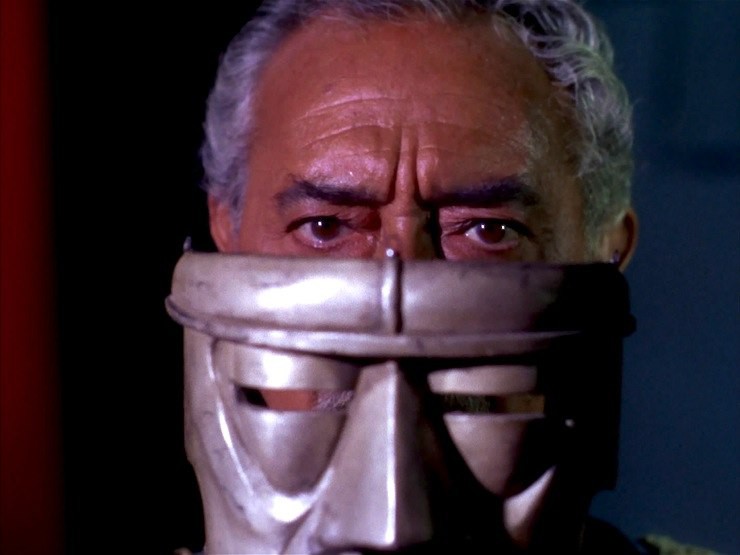
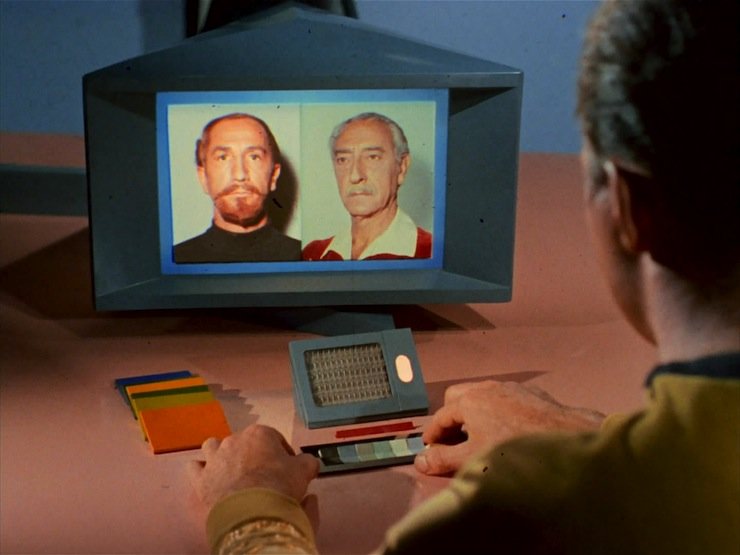
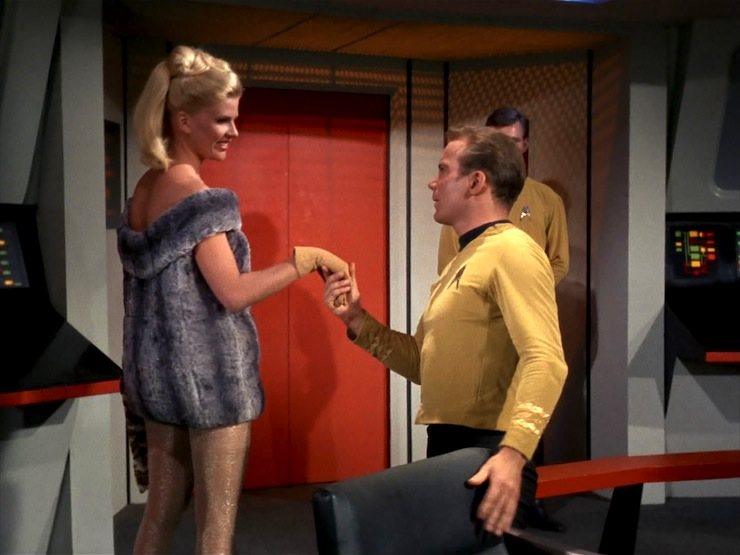
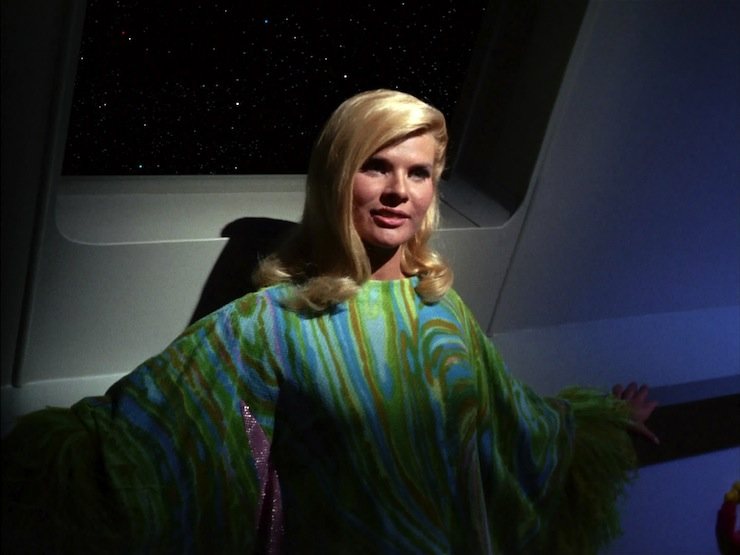
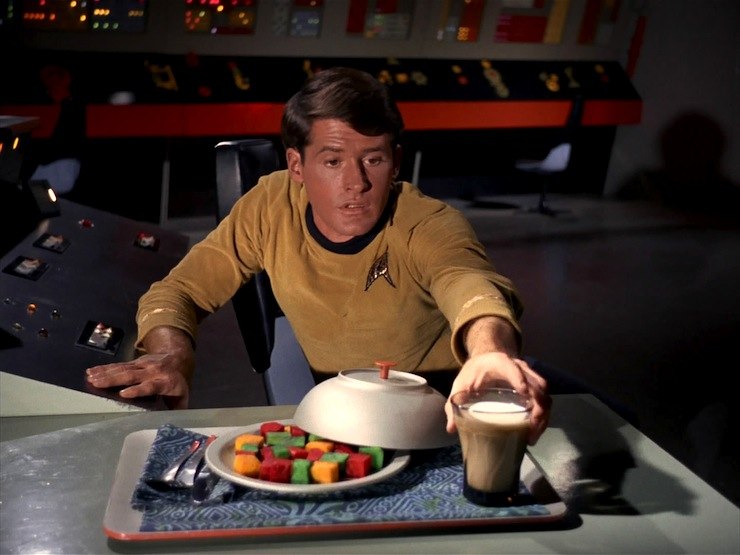
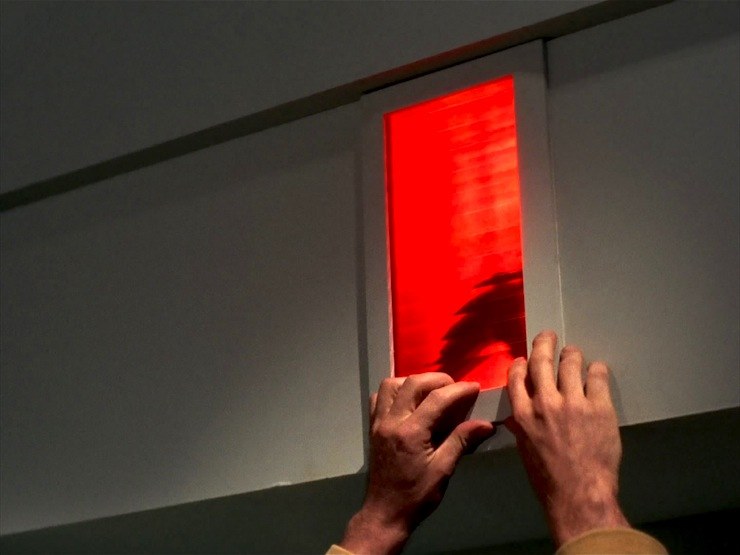
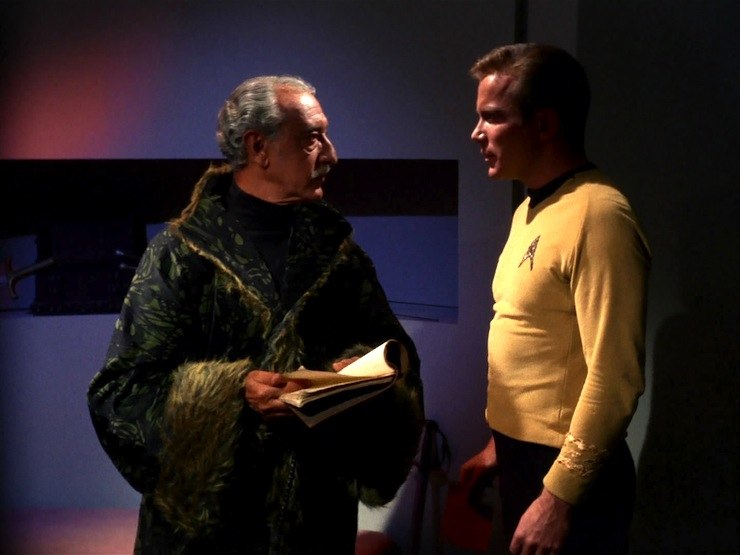
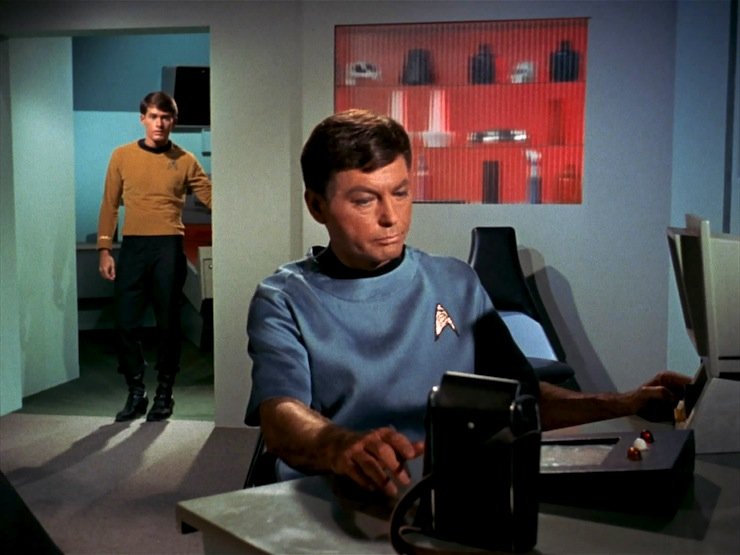
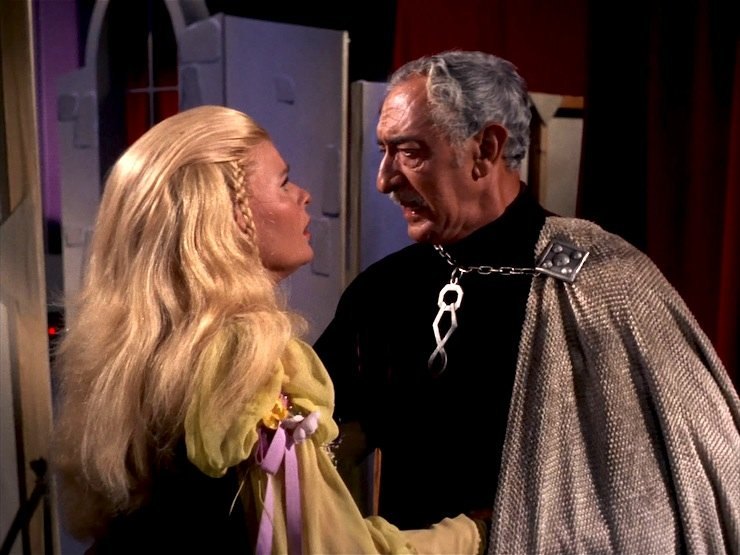
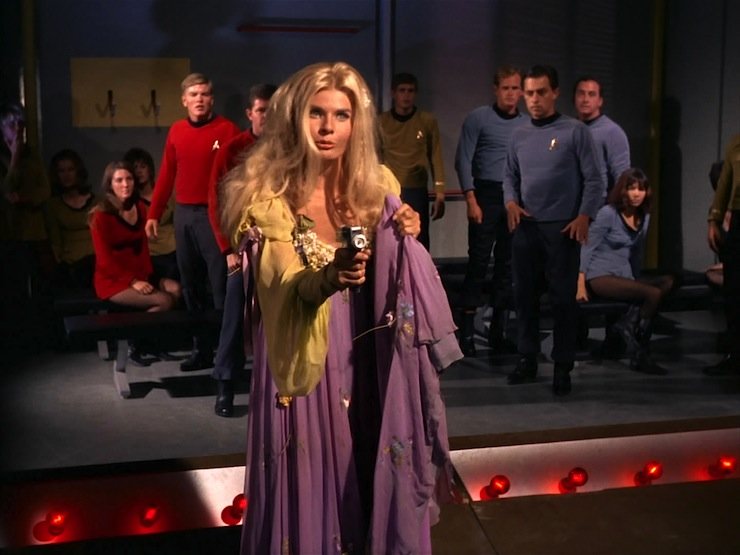
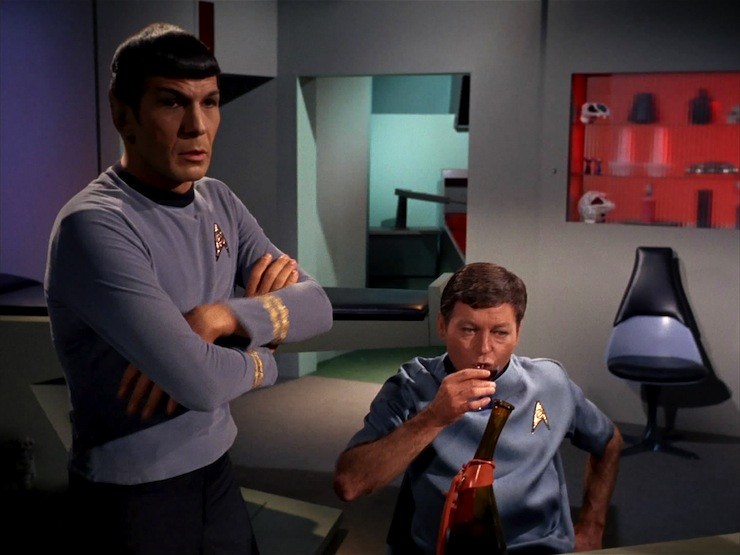
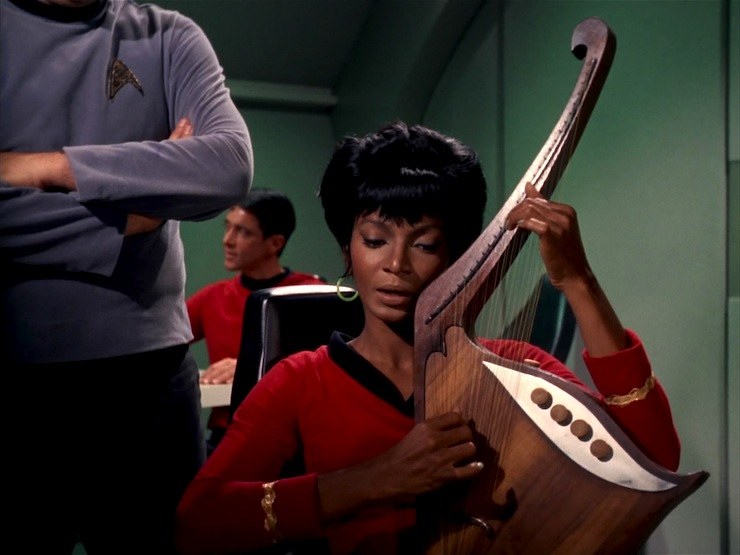
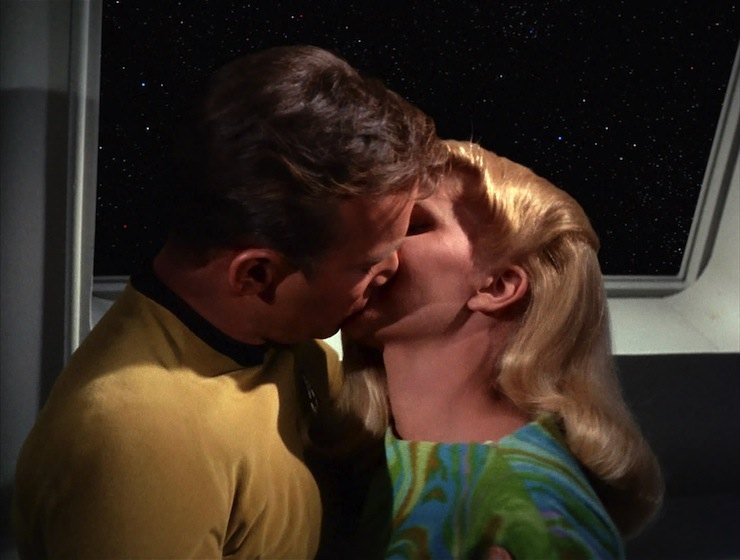
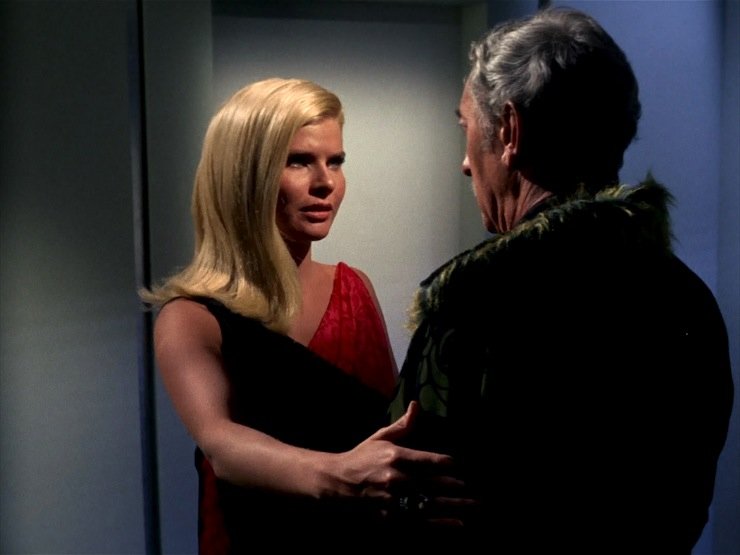
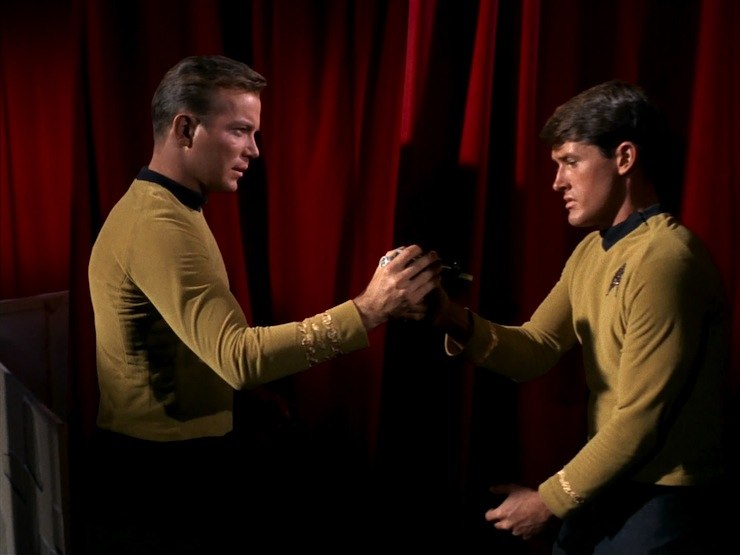
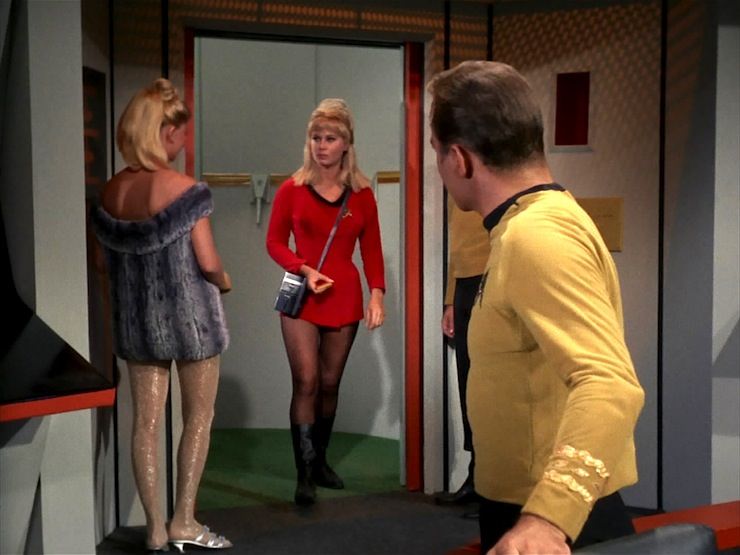
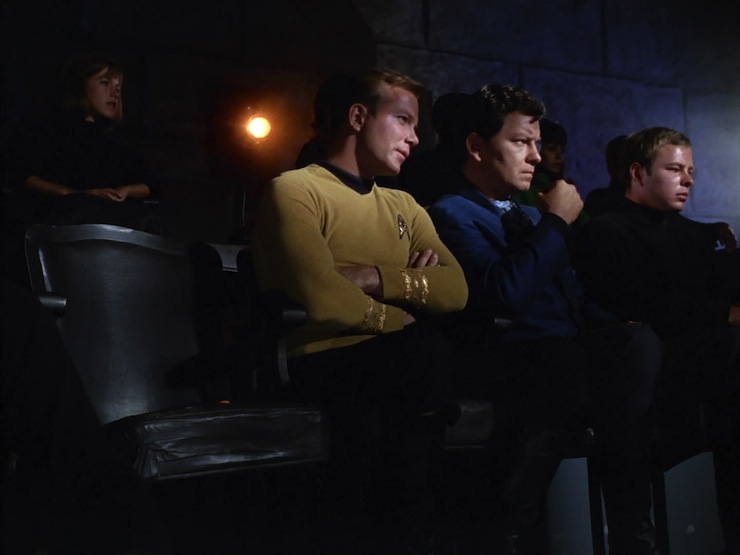
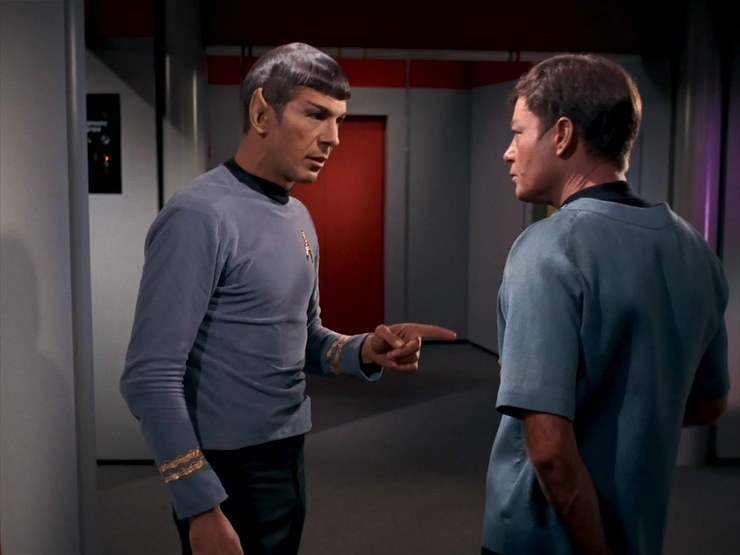
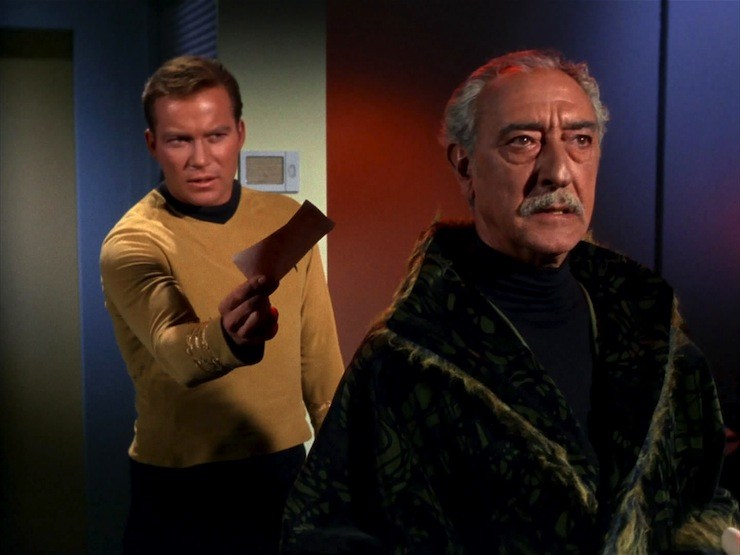
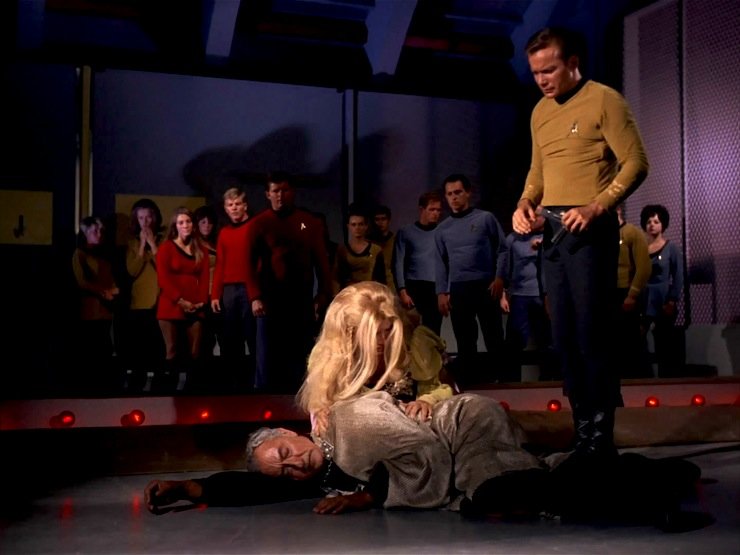
You know, I could have sworn something was said about a test other than the voiceprint, but I can’t find anything in the script. Did anybody else catch that? In any case, the voiceprint is said to be “virtually infallible” so…fat lot of good “virtually infallible” does us, eh?
Poor Grace Lee Whitney, though. Behind that look she throws Barbara Anderson is a lot of pain; after her scene was filmed, she went out and got a bottle of wine and brought it back to her dressing room.
Great picture of Riley, by the way. Those food cubes sure look tasty!
I love Uhura’s singing, schlocky as the song is. But apparently Riley’s lost his iPod privileges because he didn’t do his homework, or something like that.
The way this episode is written and directed, it would be a great one to perform in its entirety on stage as a short play itself. It’s as Shakespearean as the scenes of MacBeth used to anchor it.
Always liked this one. Barbara Anderson is one reason. The return of Kevin Riley, thus establishing something of a long-term internal continuity for the series, is another. (The same way I’ve always loved the moment in “Mirror, Mirror” when Kirk runs the biography on Mirror-Kirk and the computer says that Mirror-Kirk gained command of the Enterprise via the assassination of Captain Christopher Pike. Nice callback to “The Menagerie.” Love little continuity bits like that. I actually have the shooting script for that episode, and in it, Mirror-Kirk’s predecessor was said to be “Captain Carl Frantz,” so apparently the switch to Pike was made fairly late in the production. Big thanks to whoever made it!)
Amusingly enough, I read somewhere that when Bruce Hyde was hired for “The Conscience of the King,” he was going to play a different Enterprise crew member. But someone wisely suggested that they just give him the same name he had in “The Naked Time.” I have a feeling Christopher L. Bennett will be able to let me know whether this story is apocryphal. :-)
— Glenn Greenberg
The problem with “virtually infallible” on any test is that when you get to the really hard cases the “virtually” part starts having more and more of a margin of error :( Something that even modern juries struggle with. I must admit, I love the episode and I can get why fingerprint evidence isn’t used (in the 23rdC the cosmetic science is more than advanced enough to let you change fingerprints) and I can sorta excuse DNA if I go with them not having a sample to start with. I mean, if “Governor” doesn’t require a DNA sample and the destruction at the colony made locating definite samples.. There is a lot of handwaving away, I admit (I’m stuck on how to wave away facial recognition software, but perhaps even that is only virtually infallible). However, I think it is worth it, because the acting here is beyond excellent and the story in its simplest form of a revenge mystery is performed brilliantly. I’d put it ahead of even Space Seed and City as being one of the best of Star Trek.
I think the DNA thing can be rationalized, because a DNA comparison only works if you have something to compare it to. The massacre happened on a remote colony world, not the heart of civilization — there would never have been a famine otherwise. So there might not have been thorough records available on Kodos, or else Kodos destroyed them when he fled. Sure, they could’ve tested Karidian’s DNA against the burned body, but if it was burned severely enough, the DNA that could be extracted might’ve been too badly damaged to make a positive match.
The tricky part is that they have a photo of Kodos. A computer should be able to compare the two faces and determine a match. So that’s a harder problem to rationalize.
Another issue was just recently pointed out to me elsewhere: If Lenore was killing all the witnesses in turn, and Kirk and Riley were the last ones, doesn’t that mean she needed to get on board the Enterprise anyway? What would she have done if Leighton hadn’t lured Kirk there? Then again, maybe the E was heading for Benecia before it was diverted, and she planned to meet them there?
One thing that often gets mentioned is that Lenore was explicitly only 19 years old. Some people find it creepy that Kirk was romancing her (especially in the wake of “Miri”). That’s another difference between that era and this one. We’re so hypersensitized to sexual predation that we find large age differences creepy even when the younger partner is of legal age, which 19 certainly is. But that simply wasn’t an issue back then. Older men romancing college-age women, or sometimes even younger, wasn’t seen as objectionable. And of course, Kirk’s real agenda wasn’t to sleep with her, it was to use her to get to her father. So he was being a bit exploitative, but not in the way he’s sometimes accused of being.
This is the only Trek episode with a full score by composer Joseph Mullendore, who I believe was credited simply as “Mullendore.” It’s an unusual score for the series, but it works surprisingly well when heard in isolation on the CD set, and a lot of it was recycled later in the season. Also, Mullendore did uncredited work writing library cues that were dropped into various episodes when needed, including “Miri,” “Shore Leave” (the part where they’re running toward the gunfire), “Space Seed,” and the “mechanical rice picker” sequence in “The City on the Edge of Forever.” All his library cues were variations on the main/end title theme — not the fanfare under the “Space, the final frontier” stuff, which all the other composers quoted, but the “song” part under the cast credits, which Mullendore was pretty much the only one to use other than Courage himself. Basically, anytime you hear a variant of that melody within an episode, it’s by Mullendore, either a stock cue from this episode or one of his library cues.
Brilliant episode.
And hey, increased technology means an increase in fakes. Maybe in the 23rd century it’s as easy to fake your DNA as it is to photoshop Worf winning a fight? In the movies they use retinal scans, but can’t get that from a charred corpse.
Wasn’t Benecia a reference to the colony in which they were meant to drop off Janice Lester (Kirk) in the series finale?
I’m also confused. I thought Conscience of the King was part of the original 13 episode order that was directly produced by Roddenberry, which made me assume Gene Coon wasn’t even involved with the show at this point.
Overall, not my favorite plot, but definitely a well performed episode on all accounts, and it was nice to revisit Riley once more.
And after 26 seasons of The Simpsons, I can’t help but chuckle every time I hear Kirk pronounce the name Kodos.
@8/Eduardo Jencarelli: I’m not sure what you mean by “a reference to,” since this one came out two and a half years before “Turnabout Intruder.” But yes, “Intruder” did reuse the name Benecia, although it was pronounced differently there, “Beneesya” instead of “Benna see ya.”
I’ve thought of a way to rationalize the lack of facial recognition! Sheer population numbers. We’re told that in TNG timeframe the Federation population is in the hundreds of billions. Even accounting for less in TOS, there could still be tens of billions of humans (we seem to be the most populous race) so maybe the rates of false positives on facial recognition are just too high, especially with high freedom of movement. That is one of the things prosecutors lean on with DNA and fingerprints, that the chances of a false positive are so damn high as to be insignificant, but with higher population numbers and much more movement between populations, that chance drops.
This is really the first episode that felt, to me, like a western set in space. The score, the content, the line delivery, all of it felt like it could have taken place on “Have Gun, Will Travel” or “Gunsmoke.” Wagon Train to the Stars, indeed. I liked it a great deal, and I’ve always been able to ignore the fact that my phone can process data faster than the “Library Computer.”
McCoy’s comment about Vulcan being conquered was one of those “Say what?” moments for me when I first saw it, as it was always cut out the versions I saw in syndication.
I highly recommend Greg Cox’s novel for fans of this episode. He does a great job developing Lenore as an older character, and working through the complexities of her relationship with Kirk (which I think Cox gives more credit than they deserve; it’s pretty thin onscreen, but he really makes it seem as though Kirk did have some genuine feelings for her, which never really rang true for me, McCoy’s line and his lack of response in the tag scene notwithstanding).
I guess I’m the only one who thinks “Beyond Antares” is actually kinda pretty? It’s also a kind of a retort (probably not intentionally) to Roddenberry’s lyrics for the series theme; instead of the woman in those lyrics pining away for her man who’s off learning “love, strange love” from a “star-woman,” here we have lyrics from the p.o.v. of the person doing the wandering, pining to get back to where true love is waiting. (So double points for having a woman sing the song!) There’s a second stanza before the bridge that is cut (at least from the syndicated version – I haven’t checked out the full version in a while) but which Nicholls sings on the CD recording. (And, yes, @6/Christopher – this episode’s score in isolation was one of my surprise favorites in the whole set, right up there with “Shore Leave” and “Amok Time” and “The Cage”).
Another rationale for the lack of facial rec is that the Star Trek universe seems to be full of people who look eerily similar. Often like Jeffrey Combs.
Vulcan Conquered: McCoy is obviously referring to the latest match between the Vulcan Science Academy and Starfleet Academy (kind of like the yearly Army/Navy or Harvard/Yale). On the Starfleet side, picture all the fans, guzzling beer, getting rowdy, faces painted in school colors, doing the wave, chanting “We will rock you.”
On the other side, stone sober Vulcans watching quietly.
They lost.
The hazards of reading this column at work–I got distracted for a while and forgot that I hadn’t read the whole thing before I posted my comments!
Sorry, Keith–you addressed the Bruce Hyde/Kevin Riley quite thoroughly.
Confining myself to quarters now…
Crazy women; Kirk knows about them!
I think the review is too harsh on the technology aspects- Kodos was dictator of a colony, implying a lower tech level, and also in charge of whatever records they have. Wipe all official records, plant a body, and only random future!iPod recordings would be around.
And I hope you did not reduce the score over the show’s failure to predict DNA- which, if the burning was at a high nough temperature, still can destroy DNA evidence.
(Which CLB has already covered.)
HelenS @2- Riley had better not be listening to an iPod while on watch! The intercom is not so bad.
Ellynne @14- Love it!
Thinking about the implications of what happened on Tarsus IV. Apparently the only people left who personally saw Kodos as governor were all teenagers or younger at the time of the incident. That says some things about what Kodos’ criteria was for who lived and who died. What was Kirk doing there at that point in his life? Visiting a friend? Father stationed with the colony?
Lenore’s breakdown rant is one of the memorable set of lines and delivery in TOS.
Up until high school, everything I knew about Shakespeare I learned from Star Trek and Gilligan’s Island.
@12/MikePoteet – Rather a fan of “Beyond Antares” myself – Nichelle’s voice is quite pretty, and I like the melody.
Thanks for the various kind words about FOUL DEEDS WILL RISE. Obviously, I really like this episode, enough so that I eventually felt compelled to write a full-length novel about it. “Hmm. Whatever happened to Lenore anyway?”
Yes, TOS science didn’t hold up terribly well, and this episode relies heavily on problems that are now solved on TV every night with a DNA test/facial recognition/fingerprint. That said it could be rewritten for modern times by having Kodos plan out his escape by replacing his DNA and all other identifying information with someone else’s. That would make Leighton’s idea seem even more crazy and Kirk’s denial of the possibility more rational. But IMO it is worth it to suspend disbelief long enough for this episode. It’s a good one.
Every so often I am reminded of this incident in Kirk’s childhood which gives him such added depth which I never saw in him. To do feel like he was too flirty; he reminds of the most popular jock in high school which is not really a compliment from a geek, not that he was ever really a mean bully, but you would expect Kirk to seem a bit more traumatize if he survived Tarsus IV.
@17/Crusader75: Kirk doesn’t mention any family members who have been killed, and he was about fourteen years old when he was on Tarsus IV. I always imagined that he went there on a student exchange program. The federation would probably encourage their teenagers to visit different worlds, “real” alien ones as well as human colonies, so there should be a lot of exchange programs around.
I like “Beyond Antares” too – I like the idea that a space-faring civilization still has something like traditional folk songs, only set in space. I hadn’t thought about the aspect Mike mentioned – whether it’s the man or the woman who does the travelling – but that makes it even nicer.
Kodos is one of the most interesting guest characters in the entire series. He still thinks he did the right thing twenty years later, but at the same time he is still haunted by what he had to do (or thought he had to do). He reminds me of characters written by Alan Moore much later.
Since nobody else asked this question, what would any of you have done if you had been in his place? Let everyone die together? Ask for volunteers? Kill the old people and let the young ones live (which might be what Kodos actually did, as Crusader75 pointed out)? Harsh question, I know, I don’t mind if nobody answers…
what would any of you have done if you had been in his place
ask for volunteers,
institute a lottery – should be possible to set it up so that you can keep up with dwindling supplies.
maybe invent soylent green.
@20/SF_Fangirl: I’m not sure if Kirk should be more traumatized. If we assume that he was only visiting Tarsus IV, he went back to his family and friends and people who cared about him afterwards (which, in my experience, is the single most important thing when something bad has happened to you), and he has had twenty years to overcome any trauma.
It must have been much worse for Riley, who lost his parents and who probably actually lived on Tarsus IV, so his whole life was destroyed; and still he grew up to be the person we’ve seen in “The Naked Time”.
Besides, I think Kirk has more depth in the series than you give him credit for, if you look at episodes like “The Ultimate Computer”, “Where No Man Has Gone Before” (where we learn that he likes to read a lot, or at least did so when he was younger), or “Balance of Terror”.
@23/Jana – Interesting point about the fact that we never really found out the full circumstances of why Kirk was on Tarsus IV in Kodos’ day. I always assumed he was living there, but freely acknowledge that was just a fan’s imagination filling in gaps. If he had been visiting – wow, talk about bad timing for a family vacation.
In addition to Avenger, Shatner and the Reeves-Stevenses posit Kirk’s childhood on Tarsus IV at length in their first (and, I believe, still only) Starfleet Academy novel, Collision Course. Kodos’ bloody legacy really drives the plot, if I recall.
Has anyone explored (maybe in the ongoing IDW book?) whether Tarsus IV does or even could fit into Chris Pine’s Kirk’s timeline? I’m not necessarily saying they should – at this point, that movie series is long past needing to really and truly strike out on its own – but it would be an interesting thought experiment.
@21/Jana – A harsh question, yes, but a good one. I don’t know. Whatever action I took, I’d like to think it would be the result of community consensus and not done by autocratic fiat. Then again, seeing as how our democracy can’t even currently arrive at a consensus on what we should do about the really basic life-and-death matters already facing us, it can be hard to be optimistic such a strategy would work.
“All this power at your command,” Lenore says to Kirk, “yet the decisions that you have to make…” – Maybe the colony put Kodos in place to “make the tough calls” because they couldn’t. As several have pointed out, Moss gives us a performance (and Trivers gives us a script) that could cover such a scenario.
It also makes me wonder why, in the years after Tarsus IV, the Federation and Starfleet didn’t do something to guard against failed colonies in the future (like the world Tasha Yar grew up on – Turkana?), especially with the amazing techological resources at that society’s disposal. The advent of the replicator between the two series’ eras would change everything, it seems to me. I guess people are people, even in the bright ‘n’ shiny 24th century…
@21/Jana, @18/Meredith – Glad to hear from some other “Beyond Antares” fans! I had forgotten before this rewatch that we hear it again, briefly and hummed, in “The Changeling.” I’d enjoy hearing some new arrangement of it as source music in the next JJ-verse film. (I mean, if Giacchino can work in a few bars of Fried’s “Vulcan Fight Music”…!)
@@@@@ ChristopherLBennett : I am halfway through your newest Enterprise book. If I’m not mistaken, you have basically explained the line about Vulcan being conquered. Or am I reading too much into a few lines?
@20/SF_Fangirl: On the other hand, TV tends to overstate the potency and reliability of DNA and other forensic evidence. There’s often a lot more uncertainty than fiction admits. It’s possible to err in both directions.
@22/Bryan: As to the question of what the ethical way to deal with the crisis would’ve been, I have to ask: Would the crisis even have happened if not for governmental mismanagement? I mean, sure, they blamed a fungus for wiping out the food supply, but how did the colony end up so dependent on a food supply that could be so easily wiped out by a single infection? Why didn’t they have more variety of foodstuffs/strains, or more of a food surplus? Why didn’t they have an emergency supply of preserved foods, or protein resequencers like they used on Enterprise? And why didn’t they take more care to check whether a relief ship was coming? Why jump right to mass executions before they even knew for sure whether there was another choice?
In real life, when famine happens, it’s usually because of government mismanagement or corruption rather than actual food shortages, because modern technology means the world has more than enough food to sustain even its current huge population. And the technology 250 years from now will, of course, be even more advanced, even on a colony world. So I just find it hard to believe that the famine itself was something Kodos was blameless for. A better governor might well have been able to prevent it from happening in the first place.
@25/Theo16: Sorry, I don’t remember what part of the book you’re referring to. (I’m still recovering from a 3-week binge in which I wrote more than half of the following book, finishing nearly 3 weeks ahead of deadline. My decision to start drinking coffee may have been a factor.)
I get that burning a body might obscure a DNA sample, but I’m really confused as to why they would want to compare Karidian’s DNA to the burned body in the first place. If Karidian is Kodos, obviously the burned body was someone else. If the burned body was Kodos, then Karidian is not Kodos. I’m not sure why anyone would even expect a match there. Obviously the question would be if they had Kodos’ DNA on file from when he was knowingly alive.
He gave a great performance, btw. Although I found the recitation of Shakespeare by Lenore during the mental breakdown at the end to be a bit too much.
One thing I did really like about this episode is that we got to see the observation deck above the shuttlebay. I find the squirt bottle in the milk to be more laughable than the food cubes though.
OooooOOOOoooohh….maybe you’re talking about comparing the burned body’s DNA to Kodos’ on file DNA at the time, in order to identify the body…that makes a ton more sense.
21/22 I’d go for call for volunteers, followed by drawing of lots by the general public if there were not enough volunteers (in the case of too many volunteers, drawing of lots by the volunteers) and made sure whichever way my name was first on the list of people to be executed. I can see some sort of space-fungus just gobbling up all the food despite all sane measures taken, that is hardly unprecedented in Star Trek, but by the time it comes to executing swathes of the population to save the rest then any leader -even if they have committed no fault- has to stand up and lead by example at that point. Just as the Captain is supposed to be the last one off a sinking ship, being a leader ought to have some real responsibilities along the lines of leading by example when calling for people to be killed in the name of the greater good. That was Kodos’ real crime, he lived through his own desperate gamble. I think that is a type of guilt that Shakespeare himself would truly have grokked.
@9 You’re right. I didn’t recall Benecia was enunciated differently. I merely noticed the name on Keith’s text.
Since I’d seen the episode on Netflix less than a year ago, I chose not to rewatch this one for time’s sake (busy catching up on The Wire and writing spec material). Therefore, I didn’t even realize Benecia had no connection to the finale, other than it being the same name reused.
Obviously, I always figured the Benecia colony to be an insane asylum, since we never actually saw it from the inside, and Janice/Kirk insisted on dropping Kirk/Janice over there
The technology never bothered me: it’s old trek, they’re figuring things out, they’re a weekly show and it was the 60s. The Enterprise still seems impressive even if the inside physical representations of it’s inner workings are now quite dated (mostly).
But with phasers, transporters and warp speed, it’s still futuristic enough for me to follow along happily :)
This episode’s actors and performances were just fantastic ! Love a shakespearien trek episode!
By the iPod privileges, I meant Riley apparently wasn’t allowed access to any music available on the ship’s computer, which I figured he could have played over the speakers, radio-style. (I do that if there’s no one else home anyway — I dislike using earphones.)
@@@@@ChristopherLBennett :
I think I found the quote that made me think “very clever” in regards to that McCoy line. Perhaps mentioning it is a common way to annoy a Vulcan 100 years later.
At the end of Chapter 11 (Location 2237 on Kindle), one of the antagonists says “Vulcan was absorbed into an alliance whose military consists overwhelmingly of Earth and Andorian starships. I submit, Councillor, that Vulcan has already been conquered, a bloodless occupation made possibly by collaborators within the government.”
@33/Theo16: No, that was the rhetoric of a partisan of the corrupt, xenophobic old regime, trying to demonize the Federation. It certainly wasn’t true in any objective sense, and it’s certainly not an opinion McCoy would give credence to. It’s about on a par with the radical right saying that Obama wants to take our guns away and hand us over to the UN and impose Sharia law that is somehow also socialist.
Kirk’s inability to identify Kodos by DNA… etc. can be easily explained by the Federation respecting confidentiality of sensitive medical records.
Remember this wasn’t an official Starfleet investigation. Kirk is acting on his own initiative here. His suspicion would make insufficient grounds for him to access sensitive personal data, even if it is a dead man’s data.
(Comment deleted by its author)
@36 Thanks for letting us know. I passed this on to the production folks, who will probably get this fixed by tomorrow.
Aw…you fixed it…but I liked the bit of messing with the space-time continuum!
Great post
@35: If that’s true, then the Federation’s sensibilities of personal medical data change drastically in the next 100 years. I didn’t keep a running count during the rewatch, but there are an alarming number of HIPAA violations on DS9.
Well, as everybody has said already, there’s no reason why they couldn’t have DNA samples, etc.
@26 – Chris: Three years ahead of deadline? Wow!
@30 – Eduardo: About Benecia’s pronounciation, different actors pronounce planet and people names differently within the same episode sometimes.
@37 – Moderator: Shouldn’t your nickname be moderaTOR? :)
Deleted scene!
Riley is disgruntled after being reassigned to Enterprise sanitation after being released from Sick Bay. He hears a strange whining sound from above after someone way upstairs runs across the deck and throws something into a disposal hatch. As the whining sound gets closer and louder it dawns on him what it is.
Riley: “Oh f—-“
There is a tremendous explosion.
Kirk upstairs is talking with Rand as Riley’s mangled body is being transported back to Sick Bay.
Kirk: “So my memories of the incident on Tarsus IV have been a bit hazy since my visit to the Tantalus Penal Colon– Riley! You’re a bit accident prone lately
I wanted to add that I like the way the plays frame what’s happening in the show. When Kodos is first brought up, they’re watching the murders in Macbeth. This is a cold-blooded, unjustifiable killing by a man who will lose all his humanity because of it, becoming a true monster by the end of the play. That’s how we’re seeing Kodos at this point.
At the end, we see Hamlet. Kodos himself is the ghost of the past crying out for vengeance for unforgivable wrongs. He is the great king and a powerless dead man still bound to this world. The need to deal with the sins of the past is going to destroy his only child.
So, pretty much what’s happening in the show.
And he’s masked. His true face is hidden but it is revealed in this scene.
In this episode, Hamlet is not so much a revenge themed play as it is a play about the sins of the past overshadowing and warping the present. If we see Kirk as Hamlet–like Hamlet, he needs to be certain before he can act on something this big–this is also about him destroying a relationship with a woman he cares about because he can’t let go of the past–justifiably. While it would be easier to let it go, Kirk also recognizes it would be wrong.
However, Lenore is also a Hamlet character. The ghost of her father’s past has set her on a course of destruction. She is destroying far more of her present and future over the past than Kirk would dream of doing.
Of course, she’s also Ophelia, the girl whose daddy issues push her (literally) into madness. She may also be a bit of Lenore from The Raven, a girl who embodies death. Death (or, in this case, a pile of corpses) forms an insurmountable barrier between her and her love interest.
On one level, Kodos is comparable to Nazi war criminals. When this episode was made, World War II was only 22 years in the past. Part of his crime is that he didn’t randomly select who would live and who would die or follow an accepted standard like “women and children first” (you don’t have to agree with it, just know that it’s been considered an accepted standard for who gets in the lifeboats). His case is somewhat mitigated compared to the Nazis since he was (so he thought) in a no-win situation. It could be argued that his crime wasn’t just the murders, it was giving up hope and resorting to murder too soon.
The “custom of the sea,” where sailors cast adrift and on the brink of starvation would cast lots to see which one would get eaten is fairly well documented. However, cases where the survivors didn’t cast lots but chose who they considered most expendable resulted in prosecutions for murder.
Twenty years later, Kodos is still invested in believing he made the right choice–having done what he did, he can’t tell himself otherwise. What he failed to grasp is that it’s not about who lives and who dies. It’s about whether the community he was responsible for lived or died and in what form it lived or died. The sailors adrift were in it together. They shared out the danger of death equally. That could be understood and even honored. The sailors who turned on each other were condemned.
Kodos created a community that could either accept turning on its weaker, less valued members as morally correct or that could condemn it–and him.If they had accepted what he’d done as right, they would have accepted it as a founding principle that the powerful and the important always have the right to destroy the weak for their benefit.
@43/Ellynne – What he failed to grasp is that it’s not about who lives and who dies. It’s about whether the community he was responsible for lived or died and in what form it lived or died. I love your very thoughtful interpretation of the episode. Thanks for sharing it.
Say some more about your final paragraph. We only get Spock’s summary of the situation on Tarsus IV, but I wonder to what extent Kodos’ transformed community did accept their governor’s principle of deciding who was important enough to deserve to live. “Relief arrived,” Spock said, “but too late” — did Starfleet (or whoever) show up the day after the murders… or weeks or months or years later? What did the colonists do in that time? Were their attempted rebellions? Did people try to stand up, fight back? Or are there also analogies to the complicity of ordinary Germans in the Nazi regime (or the complicity of any “average citizen” in the evils their government perpetrates? There’s a great prayer of confession in the Book of Common Prayer, asking forgiveness “for the evils we have done and the evils done on our behalf”).
I don’t think this is where you were headed, but your insightful comments about keeping focus on the quality, not just the survival, of the community got me thinking. Thanks again for them!
@43/Ellynne: If Kirk is Hamlet, wouldn’t Lenore be more like Laertes, in that her refusal to let go of revenge led to much death and tragedy and brought about her own doom?
I don’t think we need to pinpoint exact character parallels. Obviously the episode provides us with the crucial clue by having Macbeth and Hamlet performed and Kodos=Macbeth as well as Kirk=Hamlet are more or less good fits. But the great charme of the episode is that it’s not just a transposition or modernization of a Shakespeare play but instead a pastiche of Shakespeare and indeed a very fine one.
There’s however a slight problem and it’s a matter of taste. Ellynne doesn’t speak the parallel out clearly, but the episode was shot 22 years after WWII and Kodos did commit his crimes 20 years ago, so it’s pretty clear that Trivers intended a Hitler camouflage especially since Cushman quotes on page 285 his treatment which makes direct reference to Hitler and a program of extermination. So I don’t think we’re supposed to see any shades of grey in Kodos’ actions who indeed are more of an eugenic program even if it was born out of a crisis.
But the episode then goes at great length to the trouble of having Kirk doubt himself and the necessity of prosecution as well as painting Kodos as an old man haunted by his past. This is all very Shakespearean but it doesn’t sit well along with a commentary on mass extermination. Or could anyone imagine a film about Hitler having survived WWII and being shown 20 years later as an old remorseful man haunted by his decisions?
So while I think that the episode is a tad too ambitious in trying to fuse Shakespeare and the Shoah in a 45 minute TV episode, it’s a very nice example of setting up dramatic and tragic characters and really involving one of the main characters in this drama.
Oh and thanks to Ellynne for pointing out the Lenore-Poe connection which seems very likely.
@46/Lemaitre: I didn’t say it had to be “exact” — I just felt that Hamlet wasn’t as blindly obsessed with revenge as Lenore was. Like Kirk, he hesitated in his wrath and was willing to be turned aside, even after making his tragic mistake with Polonius. But Laertes was relentless in his vengefulness, and that made him the catalyst for the ultimate tragedy.
@43/Ellynne: Interesting point about the plays. And Lenore plays Lady Macbeth in the beginning – maybe to foreshadow that she is not quite as innocent as she appears to be?
@46/Lemaitre:How doesn’t Ellynne speak the parallel out clearly? She does mention the 22 years and Nazi war criminals. Because she doesn’t equate Kodos with Hitler? I haven’t read Cushman, and don’t know what’s on page 285, but I wouldn’t equate Kodos with Hitler either. Sure, there are obvious similarities (eugenics), but neither did Kodos start a war, nor did he single out a special group of the population and claimed that they were responsible for everyone’s misfortune (at least nothing like that is mentioned in the episode). Plus, as you wrote yourself, there was no comparable food crisis in 1933 Germany. So, the episode picks one aspect of the Nazi regime and uses this to create a new setting and a new character. It’s not a one-to-one correspondence. In my book, that makes it more interesting.
@32/HelenS: But it isn’t music Riley is missing, but company. (By the way, isn’t it nice that we finally got another rec room scene?)
Oh, and thanks to everyone who answered my initial question. I noticed that I didn’t answer it myself. I like all of your suggestions, but additionally, I would not kill any children. I would also want to keep one parent or relative for each child alive, although that might antagonize the childless members of the colony…
@@@@@ 48 The problem is that Kodos is a bit too .. well likeable is the wrong word, but he’s old, he’s apparently in some way emotionally damaged by the events he caused and in the end he loses the only thing which had value to him, his daughter. This is all very moving … but a highly problematic approach in depicting a mass murderer.
And there’s really no ambiguity about Kodos’ deeds. No, he isn’t Hitler, but enough of a stand-in for him. Whatever the situation is as a leader you don’t select civilian victims for killing according to their worthiness. The only accepted approach e.g. in an overly full lifeboat would be the drawing of lots though obviously in such a situation chances are good that civilized behaviour breaks down and the survival of the fittest sets in. There’s an interesting article in German here http://www.sueddeutsche.de/reise/ueberleben-bei-schiffsungluecken-jeder-ist-sich-selbst-der-naechste-1.1426794 which essentially states that the myth of women and children first and crew last is a fiction which almost only fits for the Titanic.
We don’t learn enough about the situation on Tarsos but the famine problem is not one that forces immediate decisions within minutes or hours. Kodos apparently had time to execute (pun intended) his plans. And again the episode is a bit too ambivalent about it even though Kodos is considered guilty and Spock condemns him clearly. There’s however a “what good does it now to prosecute an old man?” atmosphere which is again highly problematic. It’s a little bit like King Lear with an old man alone out in the storm and you’re supposed to feel with him. As I’ve said Shoah and Shakespeare don’t mix well.
What I also find rather curious is the question of Kodos’ supporters. Somehow one gets the impression he did the whole killing and selecting all alone. Which is again an unfortunate similarity to the favorite German approach to Nazism after WWII where Hitler and a few Nazis were the only guilty criminals.
@49/Lemaitre: Selecting people to be killed according to “worthiness” is inexcusable. No objection here. I’m sorry that my previous posts did not address this; I thought it went without saying.
Still, I see less similarity between Kodos and Hitler than you do, though I also assume that Hitler was the “inspiration” for Kodos. I mentioned some points in my previous post, I could add others, but two of them are especially important: Kodos probably would have preferred not to kill anybody (that’s why he’s emotionally damaged), and he probably did not kill people on dubious racial grounds. (As a side note, therefore IMO the term “shoah” is inappropriate here. That’s a Jewish word for the mass killing of Jews in Nazi Germany. Using it for any mass murder trivializes it. Sorry if this sounds harsh, it’s not intended.)
So the real question is whether Shakespeare and mass murder mix well, and if it is justifiable to feel with a mass murderer. I liked it.
I’m with JanaJansen in @50 – while the alliteration of Shakespeare and shoah is cute, “genocide” is a better way of putting it when you’re not referring specifically to the Holocaust during WWII.
(I feel vaguely like I’m Godwinning even though I wasn’t first…)
Added: Also, capitalizing “Holocaust” typically refers solely to the killing in Europe during WWII; lowercase “holocaust” is perhaps a more general term, eg “nuclear holocaust.”
@41: I think he said three weeks ahead of deadline, not three years.
@42: I get the impression that the waste hatch he dumped the phaser down either led out into space or to some other contained area that wouldn’t have people in it or affected by what was in it, given their concern that the explosion would take out most of the deck.
@52: Lowercase “holocaust” can also be more generally used as a term for “sacrifice,” as in the sacrifice of an animal to a deity. In fact, this usage is where I think the name for the big H Holocaust comes from. Let me look that up. Ok, so apparently the Greek word means “whole burnt,” so it is specifically a burnt offering. So this is perhaps where the term for the Holocaust and other genocides labeled “holocaust” come from; the victims were incinerated.
I’m referring to Shakespeare and the Shoah because the episode refers to them, directly or indirectly (holocaust with its sacrificial subtext strikes me – and not only me – as quite inappropriate). Hunting for cute alliterations in this topic would be especially for a German a rather tasteless affair.
You’re right Kodos is less evil than Hitler though Spock’s expository dialogue is vague. As I said Spock absurdly ascribes all evil events to Kodos personally without ever mentioning any henchmen. However he has theories of eugenics which he probably must have thought out in advance. And according to Spock he “decide(d) arbitrarily who would survive and who would not, using his own personal standards” which sounds to me exactly like the description of a SS doctor at Auschwitz selecting the arriving jews either for work or for extermination. Notice that the Auschwitz trials had begun just three years earlier and received international attention so it seems likely that Trivers writing was also triggered by these events.
It boils down to the eternal question for writers: how much do we want to humanize criminals? Is it really appropriate to show mafia bosses as somehow likeable people like in the Godfather or the Sopranos? And the final step, is it really fitting to labor over the poor old mass murderer who has a bad conscience? It might make for good drama and richer characters but it also trivializes mass killings into a soap opera. And a real life Kodos would probably even more vehemently defend his actions than the ST Kodos does, these people usually don’t regret anything, but are firmly locked into their ideological beliefs until their death. See for that Music Box by Costa-Gavras which draws an appropriate picture of such a man.
@54/Lemaitre: Yes, on the one hand “humanizing criminals” can trivialize the suffering they caused. On the other hand, compassion is a good thing – if a story manages to evoke compassion for both the victims and the criminal, that’s fine (for me at least). After all, the episode is mostly about Kirk’s point of view, and a little bit about Thomas Leighton and Kevin Riley. We’re supposed to feel for them first and for Kodos only afterwards.
The mafia stories you mentioned are not about pity, but about glorification. Those people are supposed to be cool. That’s something else entirely.
This is one of my favorite episodes of Trek, period. I have the score from this episode on my iPod, and the music for Lenore’s breakdown is quite a highlight. I can handwave the really dated technical stuff, because the performances are just that good.
Krad, CLB, Eduardo Jencarelli, or any of you awesome people, can you tell me why Grace Lee Whitney was fired from the series? I could look it up, but I’m sure you have more insights.
Dante, according to Grace herself:
I don’t think it would ever happen, but I would really appreciate a docudrama about the making of TOS, the way Doctor Who got one for its 50th anniversary. I suspect it might open too many cans of worms, especially since so many of the principal players are still with us (thankfully, I hasten to clarify)… but I was impressed how the Doctor Who docudrama addressed some of the behind-the-scenes “warts” without losing an overall tone of respect and love for the property. Surely some talented, Trek-loving scriptwriters out there could do likewise.
Yeah, the DW docudrama was PERFECT.
@57/lordmagnusen: But isn’t that contradictory? Neither Uhura nor Chapel had been attracted to Kirk (or vice versa) in the previous episodes, so if that was the reason, the second argument makes no sense.
Besides, he never got “romances in each episode with a different person”. And how would it be “not good for him and not good for the audience”? This is weird.
Where did you find the quote? In her book?
I got it from Wikipedia, which references an article in The Sun from 2009:
https://en.wikipedia.org/wiki/Grace_Lee_Whitney#Star_Trek_television_show
@61/lordmagnusen: Thank you!
Regarding my own post @60: It just occurred to me that the statement makes perfect sense if she wanted to imply that the reason “they” told her was merely a pretext. (But I don’t know if that’s what she actually intended to say.)
I read the rewatch often, but I’ve never posted (always been on my phone which for some reason won’t let me comment, and now I’m on the computer so hopefully this one will work.)
So much to say….generally I liked the episode. I constantly demanded a DNA test or facial recognition while I watched it, but perhaps, like others said, there was no sample to compare to. And maybe facial recognition doesn’t work as well when there are different angles from the photographs? But then, I saw an app that was supposed to compare your facial features to celebrities and tell you who you look like and I got Johnny Depp with a 94% accuracy, soo….perhaps it is limited after all, lol.
Re: Riley and Rand. I really liked Riley. Fun character with a lot of potential. Quite handsome too, which I say because TOS seems to care about eye candy a little too much and someone ought to say something about the men. ;) Sad that he wasn’t there anymore after this. But Rand, I didn’t like her, even when I saw TOS in syndication as a little girl (which was when I only paid attention to stories that had girls in them, particularly pretty girls–yes, I went through that princess phase) and I like her even less now. Her role was a glorified secretary and eye candy to the captain. Phrases like she’s “too much woman” like in The Naked Time make me want to hurl, from a feminist standpoint, but I also find curious objectively because I simply don’t think she’s pretty either (but I understand that is a matter of taste.) I also resent her as an actress because apparently she’s the one who insisted on the miniskirt uniform to show off her legs. Please, couldn’t we have found a better way to increase the role of and appeal of women than resorting to physical objectification? Before she got her way, women at least could wear pants on the show.
@63/Sunshineliz – You should comment more often! I enjoyed reading your remarks.
You’re right to mention Riley as some TOS male “eye candy.” He was a handsome fellow. As for Whitney, again, I’ve been told the minskirt was viewed by many (I’m sure not by all) as an empowering expression of femininity in the 1960s. So while I prefer everyone in the crew wearing the same, modest uniforms, I can understand why Whitney might have championed them.
I find the return to the miniskirts in the JJ-films more objectionable, because they were made in the early 21st century, and supposedly we have moved on from such mindsets. Guess not, if we’re still dreaming of a future where women professionals get to/have to show off their legs while on the job.
Welcome to the comments, Sunshineliz! Stick around!
And about the miniskirts, I have to agree with Mike.
@65/lordmagnusen – Not only are the women’s uniforms in the JJ movies miniskirts, but they’re sleeveless. Really?
@63/Sunshineliz: I agree on Riley, and also partially on Rand. She always looks stressed or unhappy to me. That actually works in some episodes, like The Enemy Within or Miri, but it also makes her appear less competent. And that beehive she’s wearing is bizarre. I think Whitney complained about that one herself.
“Too much woman” is really, really bad. They even repeat it in Who Mourns For Adonais, when McCoy says about Palamas: “She’s a woman. All woman.” (It’s mostly McCoy who gets the sexist lines.)
@64,66/Mike: Nooo – they had to keep the miniskirts. They’re iconic. Of course, if that had been the cause, they would have kept them exactly the way they were, with long sleeves and black tights. They even could have made the tights opaque, made them look like leggings. Lots of women wear stuff like that these days. That would have been fine with me. Instead, well…
Here we are, discussing the Abrams films again :-)
The beehive is pretty standard for the 60s.
@68/lordmagnusen: It is? I thought buns were standard but that’s no ordinary bun. I think Whitney complained somewhere that it tended to slip all the time.
By the way, when I was 11 years old and started watching Star Trek, I was convinced that buns and miniskirts were something futuristic the writers had made up. Like three-dimensional board games. It took me years to find out the truth.
@68/69: Beehive hairdos — meaning conical, upswept styles in general — were common enough in the ’50s and ’60s. A beehive as large and elaborately woven as Rand’s, however, was taking the idea to an extreme.
Oh yes, her’s is very elaborate, but as a “futuristic thing based on something common in the production era”, it’s nothing to bat a (fake) eyelash at.
@71/lordmagnusen: I suppose the idea behind the ornate hairstyles of ST’s female personnel was that there was some kind of futuristic, automated hairdressing technology that was so fast that it could let on-the-go career women wear the kind of elaborate hairdos that would have once required a lengthy session with a professional hairdresser, so that Rand’s everyday working hairstyle could be as complex as something you’d normally only see on a princess or heiress attending a fancy-dress ball. Which I guess was a ’60s idea of progress for women.
Yeah, that was kinda what I was going for.
My reaction to this episode was similar to Leatries I didn’t like the sympathetic portrayal of a mass murderer. I also thought the more interesting story – that of the daughter trying to erase the past did not get enough time.
Kinda late to the party but I’ve just read the post and comments and remembered what always strikes me as odd about this episode.
So here’s the colony. 4000 of inhabitants are murdered. How many survived, about the same number? But after 20 years there are only 9 people who are able to recognize Kodos. What happened with the rest of survivors? I suppose Governor’s face will be generally well known to people, news broadcasts and all, so shouldn’t the number be more than 9?
Just something I have trouble explaining.
Also the fact that Tarsus IV as in surviving famine and psychological effects of witnessing what amounts to mass murder isn’t in Kirk’s medical records, othervise McCoy would have known about it. Although I think there can be some explanation along the line of this matter being classified to death or witness protection or whatever, but still slightly odd.
Re-watched this last week adjunct to my read of “The Autobiography of James T. Kirk” by David Goodman. The backstory with Kirk and Leighton on Tarsus IV is covered in some detail there. “Kirk” also expresses some regret over his seduction of the young Lenore (there are a few such instances of retroactive political-correctness in the book, including one that explains Rand’s disappearance from the crew). That resonates because Kirk is something of a pill in this episode, using Lenore unapologetically, barely blinking at the death of his friend, and jerking Spock and others around for no apparent reason other than his own internal struggle.
Really a classic episode, where the artsy pretension favored by some of the writers in that era is actually justified by the plot and theme (though Lenore’s soliloquy at the end is perhaps a bit much).
How do they explain Rand’s departure?
It’s my understanding that “they kiss and then we cut to the next scene” is a standard way of eliding sex scenes, as in “you know and I know that they went back to Kirk’s quarters and did the nasty, but we can’t explicitly say that, so fill in the blanks yourself.” This would explain how that overloaded phaser got into Kirk’s quarters (though it doesn’t explain how Lenore got ahold of the phaser in the first place, because they presumably don’t just keep the things lying around).
Lenore wears a believable variety of dresses over the course of the several days this story takes. She starts out in a kaftan like blue party dress asymmetrical and longer at the back then the front with appliqued floral type ornaments. Continues in a blue striped fur minidress that looks like it’ll slide off any minute, and collects a nasty look from Rand if I recall correctly. She wears a fitted full length gown in multi colored pinstripes with thick fringes trimming the sleeves for her ship tour/date with Kirk. A simple slip dress in brown and orange when she angrily confronts Kirk in her father’s quarters and of course her renaissance style costume for Ophelia.
The other Hitler parallel which was a slamdunk for me was the fact that Kodos’ body was found burnt beyond recognition, preventing positive identification. This was true to history, as there was no proof that Hitler died in his bunker. The remains in the hands of the Russians were genetically tested later to find out they did not match Hitler. Maybe he retired to Argentina like some other Nazis.
@80/Phil Jansen: The Soviets identified Hitler by his teeth, but they kept the results secret, so this wasn’t known in the West for many years. However, in 1947 British historian Hugh Trevor-Roper published a book that showed that Hitler was really dead, using interviews and surviving documents.
In my first year of law school, for my Contracts class I had to read a case or story (I don’t remember which it was). But, the case/story went something like this:
Sometime in the 1920s, there were 20 miners working in the lowest level of a mine. The mine had a cave-in. The 20 miners were trapped. The miners were able to telephone the mine supervisors. The supervisors told the miners that it would take the rescue crew at least 48 hours to dig the miners out and that the miners had less than 24 hours of breathable air. Then there was a second cave-in, which cut-off the telephone line from the trapped miners to the supervisors. The rescuers reached the miners in less than 24 hours. What the rescuers found were 10 living miners and 10 dead miners. The 10 dead miners had volunteered (chosen by lots) to be strangled by the 10 living miners. Eventually, the 10 living miners were convicted of murder. The 10 miners appealed their convictions, and the appellate court sustained their convictions. The legal issue we discussed in class was whether the 20 miners had a legally enforceable contract among themselves regarding the killing of the 10 miners. Has anyone else in Torland heard of this case/story?
@77/Lord Magnusen: Inspired by krad’s articles, I also took out and read The Autobiography of James T. Kirk (which I loved). In the book IIRC Kirk says he asked to have Rand transferred out, because it was too uncomfortable for him to be around her after The Enemy Within, knowing that some version of him had tried to rape her. (Or it could be that he acted uncomfortable and McCoy suggested he transfer her–I can’t remember exactly which–but it was fallout from TEW.)
I just have to say how much I love this episode! I personally curated a list for my friend to introduce her to TOS and she is coming up on this episode soon–I can’t wait til she sees it! We are both theater people (I am an actor and have done a LOT of Shakespeare including the Scottish play (Witch #1 and Lady Macduff here! Have also played Ophelia), she is a theater journalist) so she’ll love that. Plus the parallels with war crimes of WWII, Kirk’s journey to figuring out what to do, great scenes between Spock and McCoy, all the guest stars are fantastic, and to end it on a perfectly shallow note, a lot of awesome ’60s design (Mrs. Leighton’s dress, Lenore many outfits). There’s just so, so much to have fun with here.
Shallow or not I’m a connoisseur of TOS costumes. Lenore’s wardrobe is marvelously sixties futuristic, and I love Mrs. Leighton’s party gown!
@84 Harry Mudd must have liked the party gown too, since he dressed Stella’s android copy in it.
This is one of my favorite TOS episodes, but the ending is kind of botched. This was supposed to be a tragedy, yet the tragedy is deflated with some throwaway lines at the end. McCoy talks as if all Leonor needed was treatment. Apparently she’s not going to be held accountable for her murder spree and she doesn’t remember anything that happened, not even that her father is dead. It was a cheat way to end an otherwise stellar episode.
@86/Thierafhal: What are you talking about? Treatment is accountability. Star Trek was made in a time when it was still understood (at least in progressive circles) that prison sentences were supposed to be about reforming and rehabilitating people into constructive members of society, not just punishing them. And it extrapolated that forward with the presumption that future civilization would have more advanced methods for identifying the psychological factors behind antisocial behavior and curing them. It was consistently established throughout TOS, as early as “Mudd’s Women,” that rehabilitation was the preferred treatment for criminals.
Not to mention that the episode clearly established Lenore as a tragic figure, as befitted a Shakespeare-themed episode. She was a 19-year-old girl warped by what her father had done on Tarsus IV and what he’d done since to evade being held accountable for it. She wasn’t an irredeemable monster, she was the daughter of a monster, ultimately just one more of Kodos’s victims — and Kodos/Karidian sacrificing himself to stop her was his moment of repentance for all his crimes, against her as well as everyone else. So no, it wasn’t a “cheat.” You missed the whole point if you think Lenore was the villain instead of another victim.
There is no question but learning what her father did, and I’d love to know how that happened, broke Lenore. She sided with him against the galaxy and decided to make him ‘safe’ the only way she knew how. She’s only nineteen, I hope they can fix her and she gets through penance to redemption. But she killed four men and her own father, she’s going to have pay for that in some way to recover fully. I hope the Federation psychologists understand that. I like to think they do.
@88/roxana: Of course they understand it, better than we do. Americans today have this twisted and toxic idea that criminals need to be tortured and brutalized, which only makes them more damaged and antisocial and does the opposite of making them less of a threat. Dealing with crime should not be about taking revenge, but about reducing the danger a criminal poses to others. And that is done by rehabilitating and re-educating them, helping them understand their behavior and giving them positive incentives to change. That’s not being “soft on crime,” it’s using the method that actually solves the problem rather than indulging a primitive need for revenge.
Really, when people use the metaphor “pay for one’s crimes” with the implication of harsh punishment or suffering or worse, that’s failing to consider the meaning of the metaphor. To pay is not just to lose something of your own, it’s to give something to others. It’s to compensate for what you take from them by returning something of value. So nobody can “pay” for a crime just by rotting in a cell or suffering abuse or being executed. That’s just a loss with no gain. The only meaningful way to repay society for a crime is to become a productive member of society and contribute something positive. And that has to be taught and encouraged, which is what rehabilitation brings about.
The Federation of course can cure outright psychopaths and sociopaths, that makes it so much easier to be sure you’re getting through and not being played.
@87/ChristopherLBennett
Note that I used the word “accountable”. I said nothing about revenge or torture or anything of the sort. I’m simply talking about how the episode whitewashes the ending into one of it’s happy go lucky send offs when a great many tragic events have just occurred. A tragedy is so named because it’s supposed to stir our more unpleasant emotions.
@91/Thierafhal: “I’m simply talking about how the episode whitewashes the ending into one of it’s happy go lucky send offs”
What the hell are you talking about? That’s an astonishingly twisted misreading of the ending of “The Conscience of the King.” It’s nothing like how, say, “The Changeling” ends with Kirk cracking jokes about the thing that just murdered 4 billion Malurians and more than half a dozen of his crew. McCoy comes to report that Lenore has suffered a complete psychotic break. Kirk processes his regret at her fate in silence, focusing only on his duty, but McCoy acknowledges what’s left unsaid. Nothing is “whitewashed” just because nobody talks explicitly about sending her to prison or whatever. Her mind is completely broken. The father who was her world is dead through her own actions, and she’s unable to live with that, and if she ever comes out of the delusional state she’s retreated into, she’ll have to face that guilt. Surely that’s punishment enough, and the ending somberly acknowledges it through Kirk’s hard silence.
“A tragedy is so named because it’s supposed to stir our more unpleasant emotions.”
No, it’s so named because it’s supposed to make us sad, to make us sympathize with the character led to their doom by a fatal flaw, to regret that they were unable to escape it, and to recognize how there but for the grace of God go we. Romeo and Juliet were doomed by their families’ hate and their immature love. Hamlet was doomed by the pursuit of vengeance. Lear was doomed by vanity. Macbeth was doomed partly by ambition, but partly by prophecy and fate manipulating him. By the same token, Lenore Karidian was doomed by the sins of her father and her misplaced loyalty to him. As I said, she was his last victim.
@87/ChristopherLBennett
Well if you got all that from the ending than good for you. I guess that’s why you’re a successful writer and I’m just a fiction fan. I still stand by my opinion that the tragedy was deflated (not erased) by the tone of the ending.
RE: Although if I missed many of the the nuances of the ending, I attribute it to not having actually watched the episode in a long time. Perhaps when commenting on a rewatch, I should actually rewatch the episode myself instead of relying solely on memory and Krad’s synopsis =P
Regarding the lack of any decent way to identify Kodos: in a sufficiently advanced society that relies heavily on computers for everything, someone that is well enough connected could alter records in such a way that reality itself is altered for most practical purposes. Swapping DNA in files, changing the birth records that various living individuals are connected to, altering or destroying other forms of evidence.
Only the memories of living witnesses would be nearly impossible to change. If someone happened to have a voice recording of you isolated on a standalone storage device that you couldn’t reach, that to could be a firm piece of evidence as well. It would have to be on something like a memory card, something not connected to the internet in any way.
Well anyway, that’s how I kept my disbelief intact :-)
A great and highly underrated episode with a fascinating back-story and good performances all around. The episode also has a nice aesthetic “feel” to it what with the theatre group, MacBeth and the culture on the planet (bravo to the director). My only “criticism” was that Leonor probably should have been caught much earlier. I don’t know who the “police” are in the Federation, but with their advanced equipment and detection device they must have been able to figure out why there were so many murders coinciding with the acting troupe’s trajectory. I am also fascinated by how Kodos could have suddenly transformed into Karidian – I would think it would be near impossible for a human to change identities like that so easily (after all, he’s not a shape-shifting alien)
@96/Palash Ghosh: “I don’t know who the “police” are in the Federation, but with their advanced equipment and detection device they must have been able to figure out why there were so many murders coinciding with the acting troupe’s trajectory.”
What often gets forgotten these days is that TOS mostly didn’t take place in the Federation, but on the frontier. Most of the worlds we saw were colony worlds, the equivalent of Old West frontier towns, which were far from centralized authority and the heart of civilization, so that ships like the Enterprise were the primary law enforcers and protectors. That’s why the Tarsus IV disaster happened in the first place — because it was a remote colony, far enough from major population centers and supply lines that its people could suffer a prolonged famine, and that its governor would be free to act with impunity without any higher authority being around to stop him.
That’s also why it would’ve been possible to change one’s identity — because on the frontier, people would have less access to information from back home or from other colonies, so it would be easier to hide one’s past.
(Also, just to be technical, the concept of the Federation hadn’t been invented yet when this episode was written. There was just Earth and its colonies.)
98. After reading Avenger I had to get the DVD and see how neatly integrated Conscience of The King was woven into the story. But seeing it again had made me aware of the plot holes in story.
1. If Kirk hadn’t screwed her ride on the astral Queen, how would Lenore have gotten to him and Riley at a later date?
2. Speaking of Kirk screwing somebody, what was the point of putting poor Riley down alone in Engineering where he would be a sitting duck for an assassin? Hadn’t Riley been on the intercom, he would have died. How would Kirk explain that little detail to Starfleet?
3. Lenore and the phaser. Kirk says it would have taken out two decks, and admittedly, that was one hell of an explosion. Wouldn’t that have killed daddy and probably Lenore, too?
4. And let’s see if this makes sense: put poor Kevin in a room (that has no doors), and have the Doctor talking about how Karidian is suspected of being his parents killer in his log? Didn’t McCoy *think* he might be overheard since Riley was not only awake, but also walking around near and at the doorway?
I kinda like this episode, but now I have to agree, the plotholes– and not the silly DNA issue as they didn’t have forensic DNA tests in the ’60s– bring the show down to a 2 after all.
One little bit in this episode that always gives me a chuckle is when Kirk calls for DOUBLE Red Alert. Is that like Double Secret Probation?
I don’t see how an episode in which you have to disregard pretty much aspect of the plot can possibly be a 7/10.
Obviously, some things can be forgiven. It’s not Star Trek’s job to predict DNA testing, but they did have ways of identifying criminals in 1966 and the writers ought to have been able to assume some progression in that technology. Plus, they have the photo to identify him, so they don’t need the eyewitnesses for that purpose, who would be no better (and actually worse) than the photo comparison anyway. As soon as Leyton turns up dead, Kirk had more than enough reason to at least do some questioning and real investigating, but instead he invites this potential murderer up to the ship and leaves him completely unsupervised. Kirk comes across as totally incompetent here and is negligent toward the safety of his ship and crew.
Why did he transfer Riley anyway? Wouldn’t having him around be another way to verify Kodos’ identity? And how would Lenore even know he was on the ship? And why did she lead Kirk to Leyton’s body?
No, this episode is a mess on every level, it’s only redeeming feature the playing-to-cheap-seats sixties performances, if that’s your thing.
Michael Booth: Those are all fair criticisms. I thought that the performances and the way the episode first set up Kodos and then revealed him in Kirk’s scene with Karidian worked beautifully as a meditation on criminality and in showing us an old man who was trying to run away from his horrid past. It worked for me, and that outweighed the plot holes. :shrug:
That’s what makes horse races….
Also I must reiterate, the warp factor rating is the least important part of any rewatch entry.
—Keith R.A. DeCandido
This was really a well-made and moving episode. I am certain the massacre at Tarsus IV was an allusion to the Nazi concentration camps of WWII. However, why was Spock so aggressive in his certainty that Karidian was indeed Kodos, while Kirk was unsure? Wouldn’t the logical, scientific Vulcan be more circumspect in jumping to such conclusions (although he was ultimately proven to be correct)? And was it just me, but when Leonor sank into her final stage of madness in the end, did she suddenly adopt a quasi-British accent??
@102/Palash: “However, why was Spock so aggressive in his certainty that Karidian was indeed Kodos, while Kirk was unsure? Wouldn’t the logical, scientific Vulcan be more circumspect in jumping to such conclusions (although he was ultimately proven to be correct)?”
Spock arrived at his conclusion logically, by an analysis of the evidence showing that Karidian’s history began almost immediately after Kodos’s disappearance, and that the Karidian company was nearby every time a surviving witness was murdered, seven previous times. The probability of that happening by chance, across multiple planets and ships, is vanishingly low. If anything, Kirk was being too emotional in doubting the clear evidence, being afraid to follow where it led.
“And was it just me, but when Leonor sank into her final stage of madness in the end, did she suddenly adopt a quasi-British accent??”
Well, her final monologue was a mix of Shakespeare quotes, so why wouldn’t she?
Just chiming in to say that this is one of my favorite TOS episodes as well. I think I could watch it weekly and never get tired of it. I also have the soundtrack on my phone and some of the sad string bits are perfect (one of those tracks is actually name “Opheliamania”). Happy to see the “Beyond Antares” love too … I went a few years without seeing much TOS and that beautiful song popped into my head even after the years :)
Only two smaller parts that get me. Don’t think I’ve seen them mentioned but they really don’t take away my enjoyment:
1. Riley must be mid-20s (Bruce Hyde was 26) and we at least we know he’s younger than Kirk (35), so if Kirk was ~15 at the time of the massacre, how would Riley remember Kodos’s face and voice so well, being 5 or 6 at the time? Am I glossing over the effect this kind of event would have on a child and their memory?
2. Kodos made this grand, memorable speech, bad things happen, and a few days later, the remaining 4000 colonists are rescued. How is it that only 9 out of that 4000 saw/heard Kodos?
@104/Roy: Kirk was 34 in “The Deadly Years” in season 2, so he’s no more than 33 here. So Riley might have been 7-8 at the time.
@104.1 There were photos and recordings of Kodos that Riley may have studied, especially if he was unconvinced of Kodos’ death.
@104.2 The story depends on the conceit that only eyewitnesses can make the claim that Koridian is Kodos, which is rather absurd, given the photos and recordings.
I agree about the music.
@106 The premise that only eyewitnesses could prove Koridian is Kodos was iffy at the time, although somewhat possible. By now the concept has aged really badly. Current technology, DNA testing, facial recognition software, voice analysis would confirm identity pretty quickly. OTOH, it would take a witness to alert the authorities that they need to look at Koridan, so that tracks a bit. The big issue is that it is Lenore who is killing people in the belief that it protects her father and Lenore isn’t exactly grounded in reality at this point. It makes sense when looked at from her POV, not how the world would work.
@107/percysowner: The concept was problematical even then, regardless of technology. It was a small colony of only 8,000 people, and Kodos was their governor. How could they not have known what he looked like? How did he ever get elected to the governorship without anyone seeing his face?
A fellow I know wrote this http://leviathanstudios.com/Spock_Prime/ fan-fiction piece about Kodos in the Kelvin timeline.